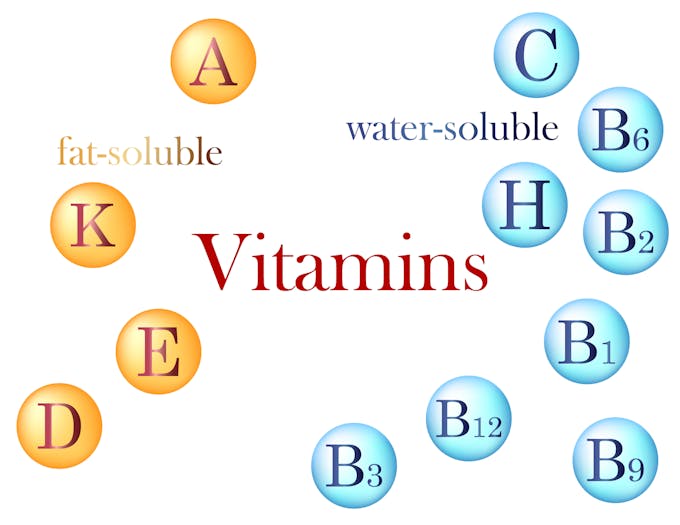Fat Soluble vs Water Soluble Vitamins When Do You Take Them
A healthy body relies on many factors, including optimal vitamin and mineral levels. While a nutritious diet like Healthy Keto® provides plenty of nutrients, taking vitamins can sometimes be helpful.
Your body stores and utilizes fat-soluble vitamins differently than water-soluble vitamins.
Understanding these differences helps you decide when it’s the best time to take your supplements and how to avoid excessive amounts that could harm your health.

Water-soluble vs. fat-soluble vitamins: what’s the difference?
There are 13 essential vitamins that are classified into two groups based on how your body absorbs and stores these nutrients.
As the name suggests, fat-soluble vitamins require fat for absorption, transport, and storage. In contrast, water-soluble vitamins dissolve in water and are quickly digested. They are easily transported via your general blood circulation.
Fat-soluble vitamins
Vitamins A, D, E, and K are fat-soluble. These nutrients require dietary fat to be absorbed and enter your circulation.
Fat-soluble vitamins that aren't immediately used for body functions are transported to your liver and fat cells for storage. Because fat-soluble vitamins accumulate in the body, excessive amounts of fat-soluble vitamins can potentially increase your risk of vitamin toxicity.
Fat-soluble vitamin deficiency is relatively rare, especially if you consume plenty of high-fat foods as part of the Healthy Keto diet. Vitamin D deficiency is an exception; many people either have a deficiency or are at risk.
Vitamin D, also known as the sunshine vitamin, is a natural beta blocker which is produced when you expose your skin to sunlight. There are some dietary sources of vitamin D, but these foods typically don’t contain enough vitamin D, resulting in an increased risk of vitamin D deficiency.
Water-soluble vitamins
Your body requires nine essential water-soluble vitamins, including B vitamins and vitamin C. These water-soluble vitamins easily dissolve and are readily absorbed and transported to your cells.
Water soluble vitamins include eight B vitamins and vitamin C:
Except for vitamin B12, water-soluble vitamins not immediately used for body functions are eliminated, resulting in little risk of toxicity.
Your body doesn't store water-soluble vitamins and excretes excess B vitamins and vitamin C via urine. Because there are no significant reserves of water-soluble vitamins, inadequate dietary intake can quickly lead to deficiency.
Watch the below video to learn more about when to take vitamin supplements.
Benefits of fat-soluble vitamins
Fat-soluble vitamins support many body functions, and adequate fat-soluble vitamin intake promotes health and well-being.
Let’s take a closer look at the four fat-soluble vitamins.
Vitamin A
Vitamin A is needed for healthy vision, supports your immune system, and regulates cell renewal. It’s also crucial for healthy skin and affects nervous system function and development.
Vitamin A-rich foods include egg yolks, dairy products, liver, and oily fish.
Vitamin E
Vitamin E has potent antioxidant properties that protect your cell membranes and fat cells from oxidative damage, which is linked to improved skin health. Research suggests that vitamin E regulates healthy cell growth and supports a healthy immune system.
Vitamin E-rich foods include nuts, nut and vegetable oils, avocados, and fatty fish.
Vitamin K
Vitamin K supports bone health and is necessary for blood clotting. A diet rich in vitamin K is linked to improved cardiovascular health and healthy blood pressure.
Vitamin K-rich foods include leafy green vegetables like kale, spinach, and broccoli.
Vitamin D
Vitamin D is an essential nutrient for immune function. It's needed for healthy bone growth and provides several neuroprotective benefits that support your central nervous system.
While oily fish, mushrooms, and fortified foods like dairy and plant milk provide some vitamin D, the best way to obtain vitamin D is through sunlight exposure.

Benefits of water-soluble vitamins
Water-soluble vitamins are essential for your health. Because water-soluble vitamins aren’t stored in the body, it’s crucial to ensure adequate intake to avoid deficiencies.
Let’s take a closer look at the functions of water-soluble vitamins.
Vitamin C
Vitamin C is needed to help your body absorb iron, which is necessary for red blood cell formation. Vitamin C also builds collagen, supports wound healing, and plays an essential role in bone formation.
Foods rich in vitamin C include citrus fruits, leafy greens, bell peppers, and tomatoes.
B vitamins
There are eight B vitamins, all of which are needed for energy production, nervous system function, and a healthy metabolism.
Folic acid and vitamin B12 regulate the production of red blood cells and protect the body from homocysteine, a harmful metabolic by-product that increases the risk of heart disease.
Pantothenic acid, also known as vitamin B5, boosts your metabolism and stimulates fat-burning. Vitamins B1, B2, B3, B6, and B7 are all involved in energy metabolism and help the enzymes in your body to function effectively.
Vitamin B-rich foods include liver and organ meats, leafy greens, oily fish, eggs, and dairy.

When is the best time to take fat-soluble and water-soluble vitamins?
Unlike water-soluble vitamins, fat-soluble vitamins require the presence of fat globules in the digestive tract to be absorbed. To get the most benefit from your fat-soluble vitamin supplements, take them in combination with a fat-rich meal.
Water-soluble vitamins don’t require fat for absorption, and the timing of taking these supplements doesn’t matter.
Some people can experience slight nausea when taking water-soluble vitamins on an empty stomach. Taking vitamins with a meal typically resolves this issue.
Multivitamin supplements that contain fat-soluble nutrients, including vitamins A, D, E, or K, are best taken with fatty foods to ensure optimal absorption of all nutrients.

Key takeaways
All vitamins are essential nutrients needed for optimal health. Fat-soluble vitamins are stored in your body and require dietary fat for efficient absorption. In contrast, your body can easily absorb and transport water-soluble vitamins but does not store B vitamins or vitamin C.
To get the most benefit from your dietary supplements, take fat-soluble vitamins and multivitamin supplements in combination with a meal rich in healthy fats. Water-soluble vitamins can be taken at any time—with or without food.
If you experience mild nausea when you take water-soluble vitamins on an empty stomach, take them with a meal instead.
FAQs
1. What are fat-soluble vitamins?
The fat-soluble vitamins A, D, E, and K require fat to be absorbed and transported to cells. Your body stores fat-soluble vitamins in your fatty tissue and liver, and excessive intake can lead to build-up and potential toxicity.
2. What are water-soluble vitamins?
Water-soluble vitamins are readily absorbed and easily transported to the cells in your body. In contrast to fat-soluble vitamins, your body excretes excess water-soluble vitamins via urine. This lack of storage increases the risk of developing water-soluble nutrient deficiency, especially if you are fasting for prolonged periods.
3. What’s the difference between water-soluble and fat-soluble vitamins?
The difference between water-soluble and fat-soluble vitamins is how your body absorbs, transports, and stores these nutrients.
While water-soluble vitamins are easily absorbed and transported, fat-soluble vitamins require dietary fat globules for absorption and transport in the bloodstream.
Your body excretes excess water-soluble vitamins and stores fat-soluble vitamins in your fat cells and liver.
4. Do I have to take vitamins with a meal?
Fat-soluble vitamins require fat for absorption, so it’s best to take them in combination with a fatty meal. You can take water-soluble vitamins without a meal.
Check if multivitamin supplements include vitamins A, D, E, or K. Take them with a meal containing some fat to ensure optimal absorption.
5. Can I take vitamins while fasting?
You can take water-soluble vitamins while fasting. Neither water nor water-soluble vitamins will break your fast.
Because vitamins A, D, E, and K require fat for absorption, take these vitamins in combination with a fat-containing meal when you break your fast. Alternatively, you can take fat-soluble vitamins with MCT oil while fasting to increase absorption without breaking your fast.
6. When should I take water-soluble vitamins?
You can take water-soluble vitamins when it’s most convenient for you. It’s not necessary to take water-soluble vitamin supplements with meals.
7. When should I take fat-soluble vitamins?
Take fat-soluble vitamins with a fat-containing meal to help absorb and transport nutrients.
8. Will vitamins kick me out of ketosis?
Typically, vitamins will not kick you out of ketosis. However, some low-quality supplements contain fillers and bulking agents, including dextrose, which is high in net carbs and can kick you out of ketosis.
Check supplement labels to identify products that contain carbs to provide bulk and hide unpleasant tastes or textures of supplements.
9. Can I take vitamins every day?
Taking vitamins every day is safe if you don’t exceed the tolerable upper limit for each vitamin. The tolerable upper limit refers to the maximum daily intake unlikely to cause adverse health effects.
10. Can taking too many vitamins be toxic?
Yes, taking too many vitamins can be harmful to your health. Because your body stores fat-soluble vitamins, the risk of fat-soluble vitamin toxicity is higher than developing adverse effects from water-soluble vitamins.
Previous blog
9 Keto Plateau Hacks How to Lose Weight Faster
Popular
08/21/2024
41.8K views
05/22/2024
37.8K views
11/18/2024
220.9K views
03/18/2024
11/21/2022




